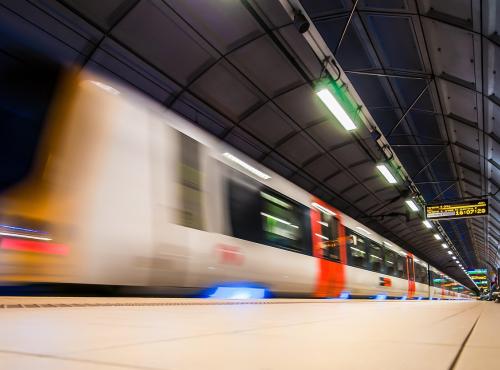Enacting and Building on the UK Government’s Accessible Railways Roadmap
The UK Government’s Accessible Railways Roadmap sets out seven priority areas to make rail travel more inclusive. As a partner in the National Centre for Accessible Transport (ncat), we are pleased that many of these priorities echo the principles championed in our Joined Up Policies, Joined Up Journeys report. That report laid out the systemic changes needed to achieve an accessible transport system, while ncat’s Understanding and Identifying Barriers to Transport research highlighted why these issues matter so deeply to disabled passengers.
Here’s how each priority connects to our work, and what the Government could do to ensure they can achieve their ambitions.
Accessibility of Stations and Trains
Inaccessible stations and trains impact more than half of disabled people. Joined Up Policies, Joined Up Journeys warned against the inefficiency of retrofitting and called for accessibility to be designed in from the outset, supported by UK-wide standards to ensure consistency.
The roadmap responds with £373 million for step-free access and a rolling programme of station upgrades, ending the stop-start funding cycle that has slowed progress for years. It also sets out a long-term strategy for level boarding and inclusive train design.
To turn these promises into reality, the government should set clear timelines and binding targets for level boarding. Establishing an Accessible Transport Standards Commission could embed accessibility into infrastructure decisions and set national standards with deadlines. Crucially, disabled passengers must have a real voice in design decisions.
Reliability of Accessibility Facilities
One broken link in the chain of transport can derail an entire journey. Without functional toilets and lifts, rail travel cannot be accessible. To reduce the time between breakage and repair, the new roadmap promises real-time status reporting, standardised lift design, and contingency plans for failures to improve the reliability of rail travel.
Having called for data-driven maintenance and transparency, we celebrate this commitment and look forward to further details on the contingency plans. Importantly, to ensure rapid repair times, accountability is necessary. The Office for Road and Rail must enforce rapid repair times through public reporting on downtime and response times, and its power to fine when necessary.
Passenger Assist Consistency
Disabled people rely heavily on staff for assistance, particularly due to infrastructure shortcomings, such as a lack of level boarding, but this assistance is frequently unreliable. To improve passenger assistance, the roadmap introduces station check-in, two-way messaging, and a national training standard for assistance staff. The roadmap also promises compensation when booked assistancefails.
While these changes are welcome, further work is needed to achieve equitable access to railways for disabled passengers. At ncat we are researching the way in which complaint processes can be improved. Our Joined Up Policies report recommends that the government must make passenger assistance a statutory duty, with Turn-Up-and-Go always available alongside booked assistance.
Customer Information
Poor, inaccessible information makes travel stressful and sometimes impossible for disabled people. ncat has repeatedly called for accurate, timely, multi-format information that is co-designed with disabled people.
The roadmap prioritises customer information through largely digital routes, Welcome Points, virtual station tours, real-time updates, and a new accessible journey planner. These are strong steps forward. But information must go beyond apps: Easy Read, paper formats, tactile signage, and integrated complaints channels are essential. Crucially, co-design should be the rule, not the exception.
Concessions & Retail Accessibility
Transport for All’s Are We There Yet? report has highlighted that cost is the single biggest barrier to rail travel for disabled people. In our Joined Up Policies report, we argued for clarity and fairness in concessions.
The roadmap expands eligibility for the Disabled Persons Railcard, improves ticket vending machines, and promises a unified online retail platform. The government’s progress towards a more expansive understanding of disability is welcome, but affordability remains a pressing challenge.
With transport impacting access to all areas of life, concessionary travel must cover travel at all times, and not just during off-peak hours. Especially at a time when the government is advocating for disabled people’s employment, the cost of travel must not prevent disabled people from accessing these opportunities.
Monitoring & Accountability
Without accountability, accessibility commitments risk becoming empty promises. In our Joined Up Policies report, we called for regulation to be strengthened through transparency. By encouraging and enforcing operators to be transparent about the accessibility measures in place, regulators can work more effectively and regain the trust of disabled people.
The roadmap introduces benchmarking for Passenger Assist, a national customer experience survey, and improved complaints handling. These are positive steps, but they need teeth. We recommend that Great British Railways publish annual public accessibility performance and enforcement reports. The Department for Transport should then display these on a national accessibility dashboard.
Cultural Change
We have repeatedly said that without centring disabled people, policy changes cannot achieve an accessible transport system. Co-production must be genuinely embedded in organisational structures, not tokenistic, and disabled people should be treated as experts. In the Joined Up Policies, Joined Up Journeys report, we called for the structural inclusion of disabled people in setting out, implementing, and evaluating strategies and standards. We also called for establishing properly funded disability panels at the national and local levels across the country.
Echoing our recommendations, the roadmap commits to forming a National Accessibility Panel that brings together the national panels from across Great Britain and commits Network Rail to establishing Joint Regional Accessibility Panels. If these changes are to be impactful, disabled people’s involvement must be more than advisory, with real decision-making powers.
Cultural change will also be the result of the behaviours displayed towards disabled people. In the Understanding and Identifying Barriers to Transport report, ncat found that negative attitudes or anti-social behaviour from the public and staff affect around a third of disabled passengers. A core recommendation of the Joined Up Policies, Joined Up Journeys report is to mandate accessibility training to public facing and senior transport staff, and coproduce training standards with disabled people.
Led by Network Rail and RDG, in line with our recommendations, the roadmap commits to developing a comprehensive disability equality training programme that is co-developed with disabled people.
The Accessible Railways Roadmap marks a significant step toward creating a rail system that works for everyone, but ambition must translate into action. Delivering these priorities will require clear timelines, binding standards, and genuine co-production with disabled people at every stage. As an ncat partner, we will continue to champion systemic change that treats accessibility as not an optional extra but as a fundamental right. You can find our roadmap for the entire transport sector here.




